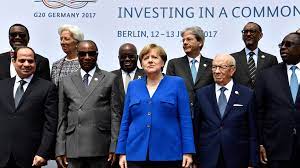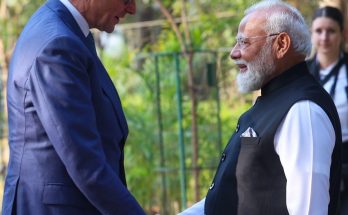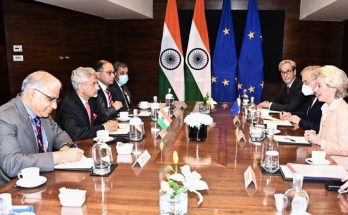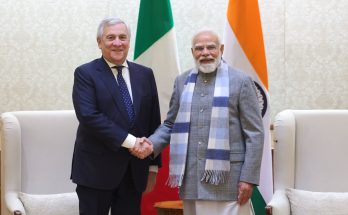Africa hasn’t loomed large in the G20 agenda so far. India’s G20 presidency is an opportunity to focus global attention on myriad challenges facing the African continent in the aftermath of COVID-19 and the Ukraine crisis. India should not only project aspirations of African resurgence on the G20 platform, but should work with its partners to secure a full membership for African Union in G20, says Rajiv Bhatia.
By Rajiv Bhatia

G20, the world’s premier forum for dialogue and cooperation on international economic and financial issues, is set to evolve further under India’s presidency for a year from December 1, 2022. Fifteen years after it held its first Leaders’ Summit (Washington, November 2008), India will host the next summit in September 2023. It is an unprecedented responsibility. While different constituencies within the G20 and outside have been busy promoting their respective agendas, New Delhi can be relied upon to adopt a holistic and inclusive strategy.Harsh Vardhan Shringla, India’s G20’s Chief Coordinator and former foreign secretary, gave an inkling of India’s likely approach to the presidency:
India’s wide acceptability in the international community, strong developing country credentials, independence in thought and action, and resilient scientific and economic base have uniquely positioned it to provide global leadership at a critical time in international affairs.
India must do justice to its diverse responsibilities as the steward of the forum which is composed of G7, the European Union (EU), and 12 other countries. There is little doubt that the interests of the developing world, especially Africa, will figure high on India’s list of priorities because since its Independence in 1947 it played a seminal role in creating and nurturing the Non-Aligned Movement, G77, solidarity among developing countries, and driving impulses of the Global South. This essay focuses attention on Africa, as part of the developing world, and its relative marginalisation in the work of G20 so far. It analyses the treatment accorded to African causes in the past, examines Africa’s specific situation in the current decade, and attempts to present a realistic picture of how the Indian presidency may advance the African agenda while serving as a powerful bridge between the developed and developing parts of our planet.
Africa @ G20
A critical perusal of the Leaders’ Declarations and related documents of the past summits between 2008 and 2022 shows that developing countries, especially Africa, received minimal attention. But there have been at least four notable exceptions to this trend. First, the Seoul Summit (November 2010) took a clear-cut line that the goal to narrow the development gap and reduce poverty was integral to achieving strong, sustainable, and balanced growth of the world economy. The trick, it underscored, was to create new poles of growth and contribute to global balancing. It proclaimed the ‘Seoul Development Consensus for Shared Growth,’ with its advocacy of six core principles, including a responsible partnership between G20 and the Low-Income Countries (LICs). The leaders agreed on nine key pillars i.e., the areas where actions were needed to remove bottlenecks for resilient growth in developing countries. Even a ‘Multi-Year Action Plan on Development’ was proposed. However, very little of the Seoul outcome was heard in subsequent years.

Second, the Hamburg Summit (July 2017) singled out Africa for exclusive attention due to its “recognition of the opportunities and challenges in African countries as well as the goals of the 2030 Agenda.” It launched the ‘G20 Africa Partnership’ which hinged on promises of enhanced investment from G7 countries against noticeable improvement in investment and business framework in willing African partners. ‘Investment Compacts’ were agreed to by seven African countries: Cote d’Ivoire, Ethiopia, Ghana, Morocco, Rwanda, Senegal, and Tunisia. Later, this number increased to 12. The annex to the declaration detailed key elements of this partnership and the process to be followed. A stand-alone G20 Africa Partnership Conference was held in Berlin in June 2017, which created a buzz. Regrettably, follow-up results proved disappointing. Third, the Osaka Summit (June 2019) raised hopes of Africa receiving special treatment, given Japan’s extensive role in creating close links with Africa since the 1990s.
But the Japanese presidency restricted itself to extending only general support to developing countries in their efforts to achieve progress towards the timely implementation of the Sustainable Development Goals (SDGs) and reiterating its continued support to the Compact with Africa (CwA). Finally, under the Indonesian presidency (2021–22), a G20 Roadmap was created for stronger recovery and resilience in developing countries including the Least Developed Countries (LDCs) and Small Island Developing States (SIDS).
It spelled out three focus areas, namely Micro, Small and Medium-sized Enterprises (MSMEs), adaptive social protection, and green economy, including blue economy through climate-resilient development. The Bali Summit Declaration referred to Africa: “We also reiterate our continued support to Africa, including through the G20 Compact with Africa and the G20 Initiative on Supporting Industrialization in Africa and LDCs.”
What Africa Needs
The G20 elite need to bring life to their words to renew Africa. The African continent is home to 17% of the world’s population. Yet it accounts for about 4% of the global GDP. More specifically, Sub-Saharan Africa (SSA) comprises low, lower-middle, upper-middle, and high-income countries, 22 of which are “fragile or conflict-affected”, and 13 are small states “characterized by a small population, limited human capital, and a confined land area.” Their economies have been badly affected by the triple shocks of COVID-19, the general economic slowdown, and the war in Ukraine. The World Bank states that the SSA economies are impacted by “higher commodity prices, higher food, fuel and headline inflation, tightening of global financial conditions and reduced financing flows into the region.” Africa’s needs, aspirations, and plans are well-known to those who regularly monitor African developments and are open to listening to African voices. The continent’s development perspective has been fully delineated in the AU’s Agenda 2063 and the UN’s 2030 Agenda for Sustainable Development.
The Covid era drew the world’s attention to two issues in particular: the vaccine injustice to Africa where the availability of Covid vaccines and medicines was far lower than in developed and emerging economies, and the indebtedness which grew in serious proportions. Through its laudable support for the Debt Service Suspension Initiative (DSSI), G20 attempted to provide much-needed relief. But its results remained well below the level of expectations generated earlier. Besides, the African Continental Free Trade Area (ACFTA) saw its launch delayed during the Covid era when Africa’s external partners were distracted and busy with their problems or those of other regions. As a result, Africa faced a serious attention deficit, as compared to the previous decade when, for example, western countries, India, and others competed with China to hold regular summit-level interactions with African leaders. In short, the past three years saw a disruption in the attention accorded by the rest of the world to Africa.
Africa still clamours for effective relief from the escalating debt and interest burden. Moreover, it needs support for its development needs covering diverse sectors such as infrastructure, agriculture and food security, healthcare, education and capacity building, job creation, and safeguards against climate change. According to TK, “These are areas that fall within the purview of G20. Clearly, Africa needs greater attention from the world’s premier multilateral forum at this critical juncture.” One way to do it is to increase its weight in the G20. Africa, composed of 54 countries, represents 27% of the total member-states (193) of the UN. Hence, it deserves to be represented better in G20. One seat, held by South Africa, is simply not enough. The suggested upgradation of the African Union from a permanent guest to a full-fledged member of the G20 should be accepted.
India-Africa Partnership
In the post-2008 period, especially during 2015-19, India took a series of significant measures to strengthen and diversify cooperation with Africa at bilateral, regional, and multilateral levels. The latter reciprocated adequately. Spelling out the ten guiding principles that shaped India’s Africa policy, Prime Minister Narendra Modi stated before the Ugandan parliament, “Africa will be at the top of our priorities.” He conveyed to the African side that the India-Africa development partnership would be “guided by your priorities.” India’s friends in Africa are now hopeful that, as the president of G20 for the year 2022- 23, India will do its utmost to support Africa’s interests in this forum. However, this needs to be placed in the larger backdrop. India has the responsibility to take care of the interests of friendly countries in other regions too such as the Indian Ocean region, South Asia, Central Asia, Southeast Asia, South Pacific, and Latin America. Taken together with Africa, this entire space is best represented by the ‘Global South’ – a term that Nour Dados and Raewyn Connell describe as below:
The term Global South functions as more than a metaphor for underdevelopment. It references an entire history of colonialism, neo-imperialism, and differential economic and social change through which large inequalities in living standards, life expectancy, and access to resources are maintained.
This description must change, and the time is right, given the global schism over the European crisis and the Ukraine conflict, where developed countries are concerned with ideology and developing countries are distressed by the economic impact thereof on their countries. While being fully supportive of critical elements of the African agenda, India will be expected to balance the diverse dimensions of its responsibilities as the president of G20. However, it is natural for India to position itself as one of the foremost leaders of the Global South, and its intentions lean in that direction. Sujan Chinoy, chair of the Think-20 Core Group of India’s G20 presidency, observed, “India will work to deliver global goods as a voice of the Global South,” stressing that the “development agenda must receive the first billing.”
What India Can Do
While balancing its obligations as the G20 president, India should aim at delivering an outcome that helps African countries and other segments of the Global South. Implementing the previous commitments made to Africa is necessary, rather than making new ones that may never materialize. A concrete focus on short-term and long-term requirements, backed by an implementable programme covering the critical needs mentioned above, is a must. But this will not be enough.
Three additional steps are desirable in this context.
First, New Delhi should be seen to be consulting Africa and other partners in the developing world. As it holds a series of preparatory consultations in the build-up to the summit next year, it should develop a new version of the ‘Compact with Africa,’ or ‘Compact with Africa 2.0.’ Second, it must closely engage with Brazil and South Africa, the next two presidents of G20 so that they remain fully motivated to carry forward the process and implement its outcomes. This will immensely help developing economies. Optimal support from the IBSA (India, Brazil, and South Africa) Forum comprising the leading democracies from Asia, Latin America, and Africa will be an invaluable asset. Of course, the third member of the current troika – Indonesia, an important emerging economy – should also be associated with this exercise. Third, the Indian government should lobby effectively with G7, China, Russia, and other G20 members to secure a full membership of G20 for the AU. Though of symbolic value, a positive decision on this score will be widely welcomed in Africa.
The Way Ahead
Recently Prime Minister Modi provided ample clarity on the essential philosophy that will drive India’s G20 presidency at a time when the world is hungry for creative and “collective” leadership. He observed: India, on the one hand, maintains close relations with developed countries, and at the same time understands and articulates well, the point of view of developing countries. On this basis, we will outline our G20 Presidency with all the friends of the ‘Global South’ who have been India’s co-passengers for decades on the path of development. Our effort will be that there should not be any first world or third world in the world, but only one world. India is working on a vision to bring the whole world together for a common objective, for a better future. A fusion of goodwill of India’s numerous partners across the regions, marshalled by the nation’s diplomatic, scholarly, and business talents, will be crucial in translating this enticing vision into reality.
Author Profile
- India Writes Network (www.indiawrites.org) is an emerging think tank and a media-publishing company focused on international affairs & the India Story. Centre for Global India Insights is the research arm of India Writes Network. To subscribe to India and the World, write to editor@indiawrites.org. A venture of TGII Media Private Limited, a leading media, publishing and consultancy company, IWN has carved a niche for balanced and exhaustive reporting and analysis of international affairs. Eminent personalities, politicians, diplomats, authors, strategy gurus and news-makers have contributed to India Writes Network, as also “India and the World,” a magazine focused on global affairs.
Latest entries
 DiplomacyJanuary 5, 2026India walks diplomatic tightrope over US operation in Venezuela
DiplomacyJanuary 5, 2026India walks diplomatic tightrope over US operation in Venezuela India and the WorldNovember 26, 2025G20@20: Africa’s Moment – The Once and Future World Order
India and the WorldNovember 26, 2025G20@20: Africa’s Moment – The Once and Future World Order DiplomacyOctober 4, 2025UNGA Resolution 2758 Must Not Be Distorted, One-China Principle Brooks No Challenge
DiplomacyOctober 4, 2025UNGA Resolution 2758 Must Not Be Distorted, One-China Principle Brooks No Challenge India and the WorldJuly 26, 2025MPs, diplomats laud Operation Sindoor, call for national unity to combat Pakistan-sponsored terror
India and the WorldJuly 26, 2025MPs, diplomats laud Operation Sindoor, call for national unity to combat Pakistan-sponsored terror







